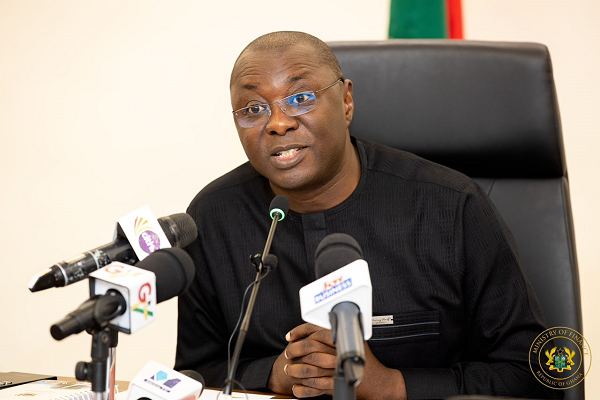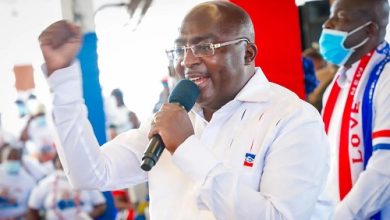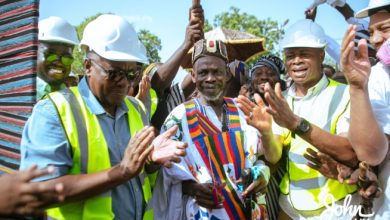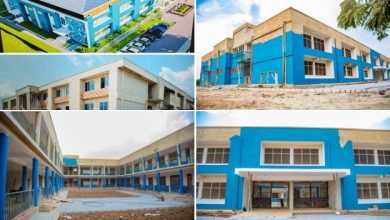Country reaches staff level agreement…Support govt to implement IMF deal – Finance Minister to Ghanaian

The Minister of Finance, Dr Mohammed Amin Adam, has urged Ghanaians to continue to support the government as it implements the three-year extended credit facility (ECF) programme with the International Monetary Fund (IMF).
Advertisement
He said the economy was on a good course, and that he was confident that things would get better in the coming months. However, Dr Adam added that it would require the sacrifice and the patience of all Ghanaians to reach the expected end.
“We will ensure that the benefits of fiscal consolidation through the reforms will lead to significant relief to Ghanaians,” he said at the weekend at a joint press conference by the IMF and the Ministry of Finance in Accra.
The press conference was to announce the successful second review of Ghana’s programme with the IMF, which has led to the country reaching a staff level agreement with the fund.
The Second Review was based on key performance indicators, including six Quantitative Performance Criteria, three Indicative Targets, and one Structural Benchmark that was due at the end of December 2023 and four Structural Benchmarks due at the end of March 2024.
The staff level agreement is the first step to unlock the third tranche of $360 million from the IMF, pending approval from the Executive Board of the fund. The board approval which is expected in June this year is, however, dependent on the country’s ability to formalise its agreement with the bilateral official creditor committee (OCC) co-chaired by France and China, as the country seeks to restructure its $5.4 billion debt to bilateral creditors.
Although the government reached an agreement with the OCC in January this year under the G20 Common Framework on a comprehensive Debt Treatment Beyond the Debt Service Suspension Initiative (DSSI), the fund expects the government to formalise this agreement through the signing of a memorandum of understanding (MoU).
Signing
Following the formation of the OCC in May 2023, the Executive Board of the IMF immediately approved Ghana’s three-year IMF programme and immediately released the first tranche of $600 million to the country.
On October 6, this year, the IMF staff and the government reached a staff-level agreement on the first review. However, an Executive Board level approval which was to trigger the release of the money was not possible until the government reached an agreement with the OCC.
The signing of the MoU will, however, represent the final step in the debt restructuring discussions with the OCC. Dr Adam said the government was confident of signing the MoU with the OCC to enable the Executive Board of the IMF to sit in June to approve the second review of the programme to unlock the $360 million financing.
Ghana’s 17th programme with the IMF has been described by many as the most expensive, as individuals and businesses continue to reel under the impact of some new taxes and the domestic debt exchange programme.
Dr Adam admitted that some of the reforms under the programme were very difficult and biting but was confident that the country would persevere together and win together.
Strong performance
For his part, the IMF Mission Chief for Ghana, Stéphane Roudet, said performance under the IMF-supported programme had been strong generally, with most quantitative targets met.
He added that good progress had also been made on the key structural reform milestones, with the authorities’ policies and reforms to restore macroeconomic stability and debt sustainability, while laying the foundation for stronger and more inclusive growth already generating positive results.
“Economic activity in 2023 was more robust than initially envisaged, and growth projections for 2024 will be revised upwards. Monetary policy has remained appropriately tight, allowing for inflation to decline rapidly,” the IMF Mission Chief for Ghana said.
“On the fiscal front, consistent with the authorities’ commitments under the IMF-supported programme, the fiscal primary balance on a commitment basis improved by over four percentage points of Gross Domestic Product (GDP) in 2023 and is on track to achieve a fiscal primary surplus of 0.50 per cent of GDP in 2024,” Mr Roudet stated.
He said spending had also remained within budget limits, while the authorities had significantly expanded social protection programmes to help mitigate the impact of the crisis on the most vulnerable.
“Ghana has met its non-oil revenue mobilisation target, while making progress in implementing ambitious structural fiscal reforms to bolster domestic revenues, strengthen public financial and debt management, and enhance transparency”.
“The external sector has improved significantly, with international reserve accumulation ahead of programme objectives. Financial stability has been preserved, with banks posting solid profits in 2023,” he added.
Commitment
The Governor of the Bank of Ghana, Dr Ernest Addison, also added that the country had shown steadfast commitment to a set of policies right from the beginning under very difficult circumstances, and had now reached a stage where programme’s implementation was progressing well.
He said with substantial progress in the measures implemented so far, the country was beginning to reap substantial macroeconomic dividends. “Inflation has dropped significantly from a peak of 54 per cent at end of 2022 to 23 per cent in 2023. The exchange rate remained relatively stable throughout last year, supported by tighter monetary policy and stronger foreign exchange reserves,” the governor said.
He added that economic growth surprisingly was higher than expected during the first quarter of this year, and that “this progress has continued although we have witnessed some slowdown in the pace of disinflation primarily due to a variety of factors, including adverse base drift effects”.
He said the expectation, however, was for the disinflation process to resume in the second quarter of 2024 and beyond, driven by continued maintenance of a tight monetary policy stance.
Dr Addison said the projection of end year inflation of about 15 per cent remained unchanged, as the central bank put in place measures to strengthen the foreign exchange reserve buffers and current account balance.





